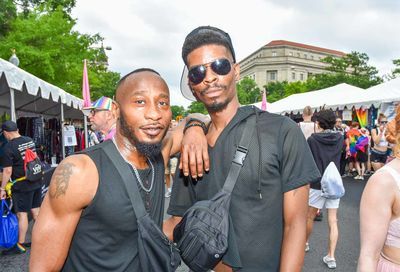Distress Calls
The U.S. Needs Soldiers and Gays are Responding. Will the Ban be Lifted? Don't Ask.
Even as the latest in smart bomb technology steams toward Iraq with Old Glory in tow, the U.S. military’s homophobe corps is still finding time to squeeze in a little gay bashing.
Between January 1st and March 1st, the Servicemembers Legal Defense Network received a record 170 calls for assistance — a thirty percent leap over the same period in 2002. The spike in requests comes in what many believe are the final days before the launch of a U.S.-led war with Iraq.
|
Steve Ralls, Director of Communications for SLDN, attributes the increase to a rise in anxiety on the part of gays and lesbians who may not be able to seek help once they’re engaged in combat.
“If you’re deployed in the middle of the desert, it’s very difficult to get help if you’re harassed, ” says Ralls. “If you’re serving on the front lines in active duty, a wartime discharge can be very hard. ”
The number of Don’t Ask, Don’t Tell-related discharges generally decreases during times of war, but so far, every branch of the armed forces has elected to keep the policy intact. In times of conflict, the military sometimes issues “stop-loss orders, ” which suspend certain discharges temporarily. So far, only the Marine Corps has issued such an order, and it does not suspend Don’t Ask, Don’t Tell.
Ralls considers it “very, very unlikely ” that any branch will suspend that policy. During Operation Enduring Freedom, none of the stop-loss orders included gays. And last fall, seven Arab linguists were discharged under Don’t Ask, Don’t Tell, despite the critical shortage of Arab speakers faced by the military.
SLDN, which has only two attorneys and one legal director on staff, has an open caseload of 130 to 150 cases at any given time. A war with Iraq would be the largest military mobilization since the organization was founded ten years ago.
Last week, Secretary of State Colin Powell defended the Don’t Ask, Don’t Tell policy in an interview with TeenInk Magazine.
“I’m an advocate of that policy, ” he said. “I helped put that policy in place and I’m accused, therefore, of supporting homophobia. But I think it’s a different matter with respect to the military because you’re essentially told who you’re going to live with, who you’re going to sleep next to. ”
Powell is both a politician and a military general. Which of these positions most heavily influences his support for Don’t Ask, Don’t Tell is up for debate. Jamie Fellner, Director of the U.S. Program of Human Rights Watch, thinks age is a factor.
“He warns about things like men sleeping in bunks next to each other, reflecting that stereotype of predatory gays, ” she says. “I think people who are thirty-five and younger have a much better comfort level with gays than people from his generation. ”
But even some politicians have come out against the ban, including Senator Mark Dayton (D-MN), a member of the Senate Armed Services Committee. Fellner believes that the military “permits and even encourages ” homophobia, even as the rest of society moves on.
“I hear people say, ‘I don’t want to have to worry about getting hit on in the foxholes. As if people are going to be hitting on each other in combat zone foxholes. I mean, really. ”
The rise in calls to SLDN also coincides with a study published in the current issue of International Security that criticizes Don’t Ask, Don’t Tell. Entitled “A Modest Proposal, ” the study identifies a shift in the argument for the gay ban from one of military effectiveness to concern for the privacy of heterosexual soldiers.
“The ‘privacy’ rationale has been around for a long time, but since the ‘effectiveness’ rationale has been shown to be without merit, opponents of gays in the military are now drawing more on the privacy argument, ” says Aaron Belkin, co-author of the study and Director of the Center for the Study of Sexual Minorities in the Military (CSSMM) in Santa Barbara, California.
The study argues that the gay ban actually infringes more on the rights of straight soldiers, citing the extensive investigations conducted by the military to confirm sexual orientation.
“The military wants to ensure they’re not discharging straight people who are using the gay excuse as a Get Out of Jail Free card, ” he says. “Sometimes they interrogate twenty five friends, lovers, and relatives of the person being investigated. ”
Belkin also argues that much of the same-sex coupling occurs between straight soldiers. He says that the military knows this, and points out a little known federal law as proof. This law, known euphemistically as the “Queen for a Day ” law, allows soldiers caught in same-sex encounters to avoid a discharge if they can prove that they are straight.
“If the military kicked out everyone who has same-sex sex, they’d be kicking out a lot of straight people, ” says Belkin. “They don’t want to do that, and so the Queen for a Day law lets soldiers have same-sex encounters — as long as they’re straight. ”
SLDN expects the influx of calls for help to continue increasing, projecting a record 1,100 calls in 2003. The group estimates the number of gays and lesbians currently on active duty at eight to ten thousand.
“We know from private practice attorneys who were involved in military law during the Persian Gulf War that there were hundreds of calls per day from gay and lesbian troops seeking assistance, ” says Ralls. “We don’t know for sure that that will happen this time, but our legal team will certainly be very busy in the coming months. ”
Support Metro Weekly’s Journalism
These are challenging times for news organizations. And yet it’s crucial we stay active and provide vital resources and information to both our local readers and the world. So won’t you please take a moment and consider supporting Metro Weekly with a membership? For as little as $5 a month, you can help ensure Metro Weekly magazine and MetroWeekly.com remain free, viable resources as we provide the best, most diverse, culturally-resonant LGBTQ coverage in both the D.C. region and around the world. Memberships come with exclusive perks and discounts, your own personal digital delivery of each week’s magazine (and an archive), access to our Member's Lounge when it launches this fall, and exclusive members-only items like Metro Weekly Membership Mugs and Tote Bags! Check out all our membership levels here and please join us today!























